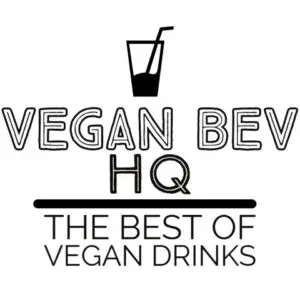Red wine, White wine, Blue wine – but what about vegan wine? Okay, blue wine isn’t actually a thing – that was just there to grab your attention – but all joking aside the question we are asking is a serious one. Why is wine not vegan? Whoa, wait a minute there – that is a trick question, right?! Isn’t all wine vegan? I mean why wouldn’t it be? It is just grapes, water, and sugar fermented. How on earth could that not be vegan? Is this just a white wine thing or is it a red wine thing? Well, in this blog post we are going to answer all those nagging questions on why wine is not vegan and what the differences between vegan and non-vegan wines are.
Is Wine Vegan?
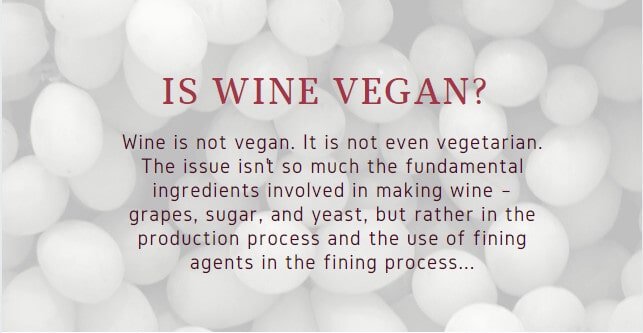
As a general rule, most wine is not vegan – it is not even vegetarian. This is due to the production process instead of the fundamental ingredients in winemaking which are usually vegan. There are essentially five steps to making wine: harvesting, crushing and pressing, fermentation, clarification, and then aging and bottling. Clarification is the process that makes a lot of wines not vegan. This is due to the fining agents often being derived from animal products.
If you want a detailed and pictorial guide of how it is done we recommend checking out this step-by-step process from Wikipedia or a simpler guide from Wine Folly.
The Quest For Clarification – Why is Wine Not Vegan?
The issue in the process is the “clarification” process. Specifically, a process called “fining”. You see following the fermentation process wine is left cloudy and hazy. This is the result of molecules such as proteins, tartrates, tannins, and phenolics produced from the fermentation process. These molecules create a hazy and cloudy mixture that can affect flavor, color, and texture (tannins are bitter people).
Now, can you imagine getting a hazy glass of wine? Completely unacceptable. Who wants a cloudy, hazy, unrefined wine? No-one! So, wine producers remove these additional particles in a process called “fining”, using things known as “fining agents”.
That makes sense, right?
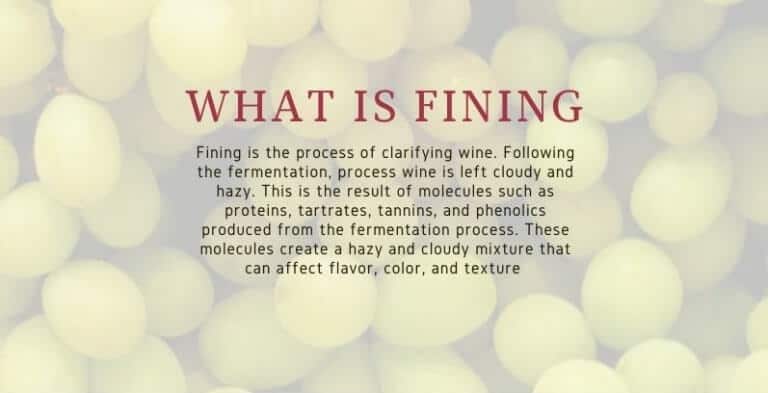
Fining Agents And Vegan Wine – Why Is Wine Not Vegan
Fining agents simply work by binding to these unwanted molecules, clumping them together in bigger masses which can then be easily filtered and removed from the wine. Or to be explained another way:
“The fining agent reacts with wine components either chemically or physically, to form a new complex that can separate from the wine.” Australian Wine Research Institute
The result is a clear and clarified wine that can be aged and bottled.
However, when it comes to Fining Agents some are just more equal than others. And, by saying that what we really mean is that a whole load of them are not vegan.
What Are The Most Commonly Used Fining Agents And Do They Make Vegan Wine?
Don’t believe us, then check out this list from the Australian Wine Research Institute that lists the most commonly used Fining Agents in wine:
- Gelatin
- Isinglass
- Egg whites (egg albumen)
- Casein
- Skim milk
- Bentonite
- Carbon
- Polyvinylpolypyrrolidone (PVPP)
Can you guess which of these are vegan? In fact, can you even guess which one of these is vegetarian? How about we go through the list.
Vegan Wine and Types of Fining Agents – Why is Wine Not Vegan
- Gelatin – is the most aggressive of the fining agents but is definitely not vegan. You see gelatin is a source of collagen extracted from the skin, bones, and connective tissue of animals;
- Isinglass – this is another form of gelatin used primarily in wine whites. It helps clarify wine to the clear white color we all love. However, it is not vegan as it is obtained from dried swim bladders of fish.
- Egg whites – are used primarily in red wines to remove phenolic compounds, we probably don’t need to explain why this isn’t vegan.
- Casein – this is a protein found in milk proteins and is used for fining white wines. Again, not vegan.
- Skim Milk – again, pretty explanatory – is another non-vegan fining agent used to remove phenolic compounds from wines.
- Bentonite – now we know what you are expecting, but you would be wrong. Bentonite is actually a vegan fining agent. You see, Bentonite is a type of very fine clay made of aluminum silicate. Made specifically from volcanic ash, this fining agent is used to remove proteins in white wine.\
- Carbon – is an extremely severe and unspecific fining agent to use. Essentially, activated charcoal is used in the process mixed with ethanol. This one is vegan.
- Polyvinylpolypyrrolidone (PVPP) – with such a long name this must be a synthetic fining agent, and that it is. It is a synthetic polymer often used in conjunction with carbon to remove pink color and pinking compounds in white wine. Essentially this is man-made plastic and as such is vegan.
Did you manage to guess which fining agents are vegan and which are not? Out of eight, only a total of three commonly used fining agents are vegan. Believe it or not, a long time ago blood was used as a fining agent before it was made illegal.
Why Do All Wine Makers Not Use Vegan Fining Agents?
Primarily, it is a matter of cost. The other non-vegan fining agents are more readily available and cheaper to buy.
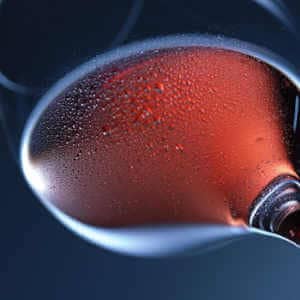
Does Fining Even Need To Happen for Vegan Wine?
Believe it or not, fining is purely a commercial step in the wine-making process. Wine will, over time, naturally fine itself without the addition of fining agents. The issue is that this natural process will take months to complete. The process with fining agents is much quicker saving time and money for consumers and producers working typically in 3 – 5 days and sometimes even as quick as 1 to 2 hours with PVPP. If you want to learn more about fining agents check out this article from WineMakerMag.com.
How Can I Tell If My Wine Is Vegan Wine Or Has Been Fined With A Non-Vegan Fining Agent?
Now, the most important question. How can you tell if your wine is vegan and has a non-vegan fining agent used in it? Well, this is the hard part. That is because winemakers are not required to disclose whether their wine is vegan or vegetarian. Currently, in the United States wine-makers are not required to disclose major allergens on alcohol beverage labels under the Federal Alcohol Administration Act (FAA Act). The rules were slightly amended by the Alcohol and Tobacco Tax and Trade Bureau (TTB), which let manufacturers decide to declare these allergens, but it is not mandatory. In fact, the TTB only mandates the following information must be provided on wine labels:
- Appellation of Origin
- Brand Name
- Class or Type of Designation
- Percentage of Foreign Wine
- Alcohol Content
- Color Ingredient Disclosures
- County of Origin
- Health Warning Statement
- Name and Address
- Net Contents
- Sulfite Declaration
Notice anything missing? How about ingredients? If you want to learn more about the label requirements for wines you can check out the TTB guidance page.
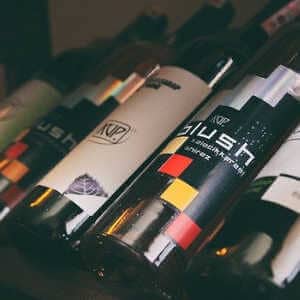
How Do You Know if Wine Is Vegan?
To know if wine is vegan, ask/search for two things:
- “Does this wine say it is vegan? / Do you have any vegan wine?” Does the front or back wine label say “Vegan”? With Veganism growing winemakers are now advertising the fact that their wine is vegan on the front label. Makes life a lot easier;
- “Does this wine say it is unfined? / Do you have any unfined wine ?” Does the front or back label say “unfined”? Unfined wines will not have undergone any of the fining processes meaning they will not have been subjected to any non-vegan fining agents.
If you have a particularly knowledgeable wine merchant to hand you could specifically ask what fining agents have been used to ensure no non-vegan fining agents have been used. However, without mandated allergen labeling requirements this process is more of a needle-in-haystack type strategy.
Why Is Wine Not Vegan – The Final Sip
To go back to where we started: why is wine not vegan? A lot of wines are not vegan because of the fining agents used in the process. Is wine vegetarian? Again, mostly no. The fining agents used are often not just the by-products of animals, but animal proteins themselves. How can I get vegan wine? Ask two simple questions: (1) can I see the wine label (does it say vegan on it?); and (2) can I have an unfined wine, please?
You see it does not matter if it is red, white, or even blue. In our quest for clarity, we have made a bunch of compromises, but change is coming. Vegan wine is growing in popularity and so is people’s awareness of the manufacturing process.
Now, what was that? Please can I have some vegan wine brand recommendations – what an excellent suggestion.
8 Vegan Wine Brands
Les Jamelles (https://www.les-jamelles.com/en/our-wines/)
Frey Vineyards (freywine.com)
Lumos Wines (lumoswine.com)
Bellissima Prosecco (bellissimaprosecco.com)
Layer Cake (layercakewines.com)
Red Truck Wines (redtruckwine.com)
Natura (naturawines.com)
Hob Nob (hobnobwines.com)

…now you know.
Beverage makers may change ingredients and/or manufacturing processes. Always double-check ingredients before purchasing any beverages.
Please Drink Responsibly.
Like what you are reading?
Like this article, want to find out more? Want to know if your favorite wine or spirit, or even if your morning coffee (yes, your morning coffee) is vegan? Then check out some of my other articles:
General
- Is Alcohol Vegan? How To Know The Truth
- Vegan Alcoholic Drinks – List of Vegan Alcoholic Brands You Need To Know
- What Alcoholic Drinks Are Not Vegan? The Complete Guide
Wine
- Over 100 of the Best Vegan Wines
- The Best Vegan Wine Subscriptions and Vegan Wine Gifts
- The Best Cheap Wines Under $5
- Best Vegan Organic Wines (and How To Know What To Look For)
- Is Champagne Vegan? Revealing The Truth Behind The Bubbles
- The Best Vegan Sparkling Wines For Every Budget
- 10 Non-Alcoholic Vegan Wines You Need To Know About and Try
- 13 Of The Best Vegan Red Wine By Grape Varieties
- 10 of the Best Rose Wines (including Sparkling & Boxed)
- The Best Vegan White Wines And Where To Buy Them
- 5 Vegan Boxed Wines You Need To Try (& Those To Avoid)
- Vegan Wines At ALDI You Need To Know About
- 10 Vegan Wines at Costco You Need To Know About
- 15 Wines At Target You Need To Try
- Introducing The 10 Best Vegan Wines At Walmart
- The Best Vegan Wines At Sprouts You Need To Know About
- Vegan Wines at BevMo! You Need To Try
- 10 Vegan Wines At Whole Foods You Need To Know
- 10 Vegan Wines At Trader Joe’s You Need To Try
